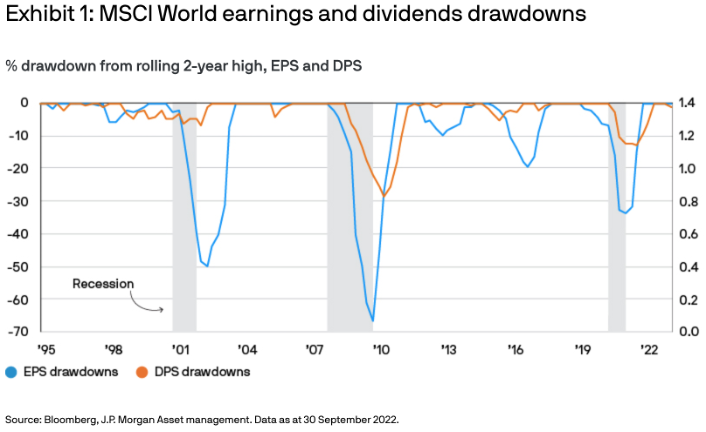10 high-yield dividend shares with a great track record
2nd November 2022 12:48
by Ben Hobson from interactive investor
It’s not always easy hunting for attractive yet sustainable dividend payouts, so stock screen expert Ben Hobson has done the hard work for you. Here, he explains how he does it and how you can too.

Falling share prices have pushed up the average yield on UK shares this year, making dividends an increasingly attractive option in the search for returns. But faced with a host of economic worries, and dividend yields that sometimes seem too high to be believed, investors need to tread carefully.
There’s an old saying in the City that stock markets hate uncertainty - and we’ve got quite a bit of it at the moment.
Inflation has been trending upwards in the UK for 18 months, and current rates of just over 10% are higher and stickier than many expected.
- Discover: How to buy Shares | Free regular investing | Super 60 Investment Ideas
Then there is recession, or at least some serious economic turbulence, which now seems inevitable. Rising interest rates (to fight inflation) are likely to put the brakes on consumer spending and stifle growth.
Some evidence suggests that firms are already feeling the impact of these pressures. There were 86 profit warnings from London-listed shares between July and September. That was a sharp increase on the 51 that were issued in the same period last year, according to accountancy firm Ernst & Young.
Dividends to the rescue
Recent data from investment services firm Link Group, shows that despite the uncertainty that companies currently face, dividends have held up well.
The overall payout from UK shares in the third quarter of the year reached £31.4 billion. That was down 8.4% on last year, largely due to fewer special dividends and the delisting in London of big-paying mining giant, BHP.
One eye-catching finding is the impact of the strong US dollar against the pound. Foreign exchange boosted the value of cash making its way back to shareholders by £1.9 billion in the third quarter. That uplift is expected to contribute £5.7 billion for the year as a whole.
In terms of sector performance, mining companies eased back on their payouts because of falling metals prices. But the mining sector continues to be the biggest contributor to dividends overall.
- 10 dividend shares to protect your portfolio from the weak pound
- Is the UK still the top dog for income investors?
Oil and gas industry payouts rose by a fifth to £2.6 billion, but banks and financial firms made the largest impact, with payouts up by 49% to £8.2 billion for the quarter. Apart from energy and mining, financials have been one of few sectors to hold up well this year, with rising interest rates translating into higher profits.
Overall, total dividends are expected to hit £97.4 billion in 2022, with lower share prices pushing the forecast average yield to 4.2%.
Hunting for sustainable payouts
While the latest data shows that dividends are proving resilient, the question is whether they will remain stable in the face of growing pressure on company earnings.
A look back at history suggests they should hold up well, according to research into global dividend payouts by the investment bank JPMorgan.
As you can see from their chart below, historically dividends (the orange line) do not fall anywhere near as much as earnings (the blue line) during recessionary phases.

One reason for this is that companies loathe cutting dividend payouts because of the signal it sends to the market.
While dividend cuts are an obvious cost-saving measure in an emergency, many companies prefer to draw on their reserves to cover payouts in a downturn.
JPMorgan’s view is that you can see this preference for maintaining dividends by looking at payout ratios (the proportion of earnings paid out in dividends). Payout ratios are currently quite low because many companies are still reinstating their payouts post-Covid. But rising ratios can point to companies soaking up the pressure on earnings to keep their dividends intact.
The Covid crisis forced many companies with solid dividend growth records to cut their payouts. But there are still plenty of firms that have a consistent history of paying and even increasing their dividends. In JPMorgan’s words, these kinds of companies tend to be the ones that outperform in a recession.
For added comfort, an income strategy looking for an attractive yield and a good payout record should also look for signs of robust financial health.
One option is to use an accounting-based checklist like the Piotroski F-Score - or your own version based on the same approach. The idea is to check that the company is improving its balance sheet strength in a few key areas. This is a checklist you can use in almost any strategy, and it’s a useful guide to whether a dividend is sustainable. Companies don’t have to pass all the tests - but the more the better.
Is the company:
- making a profit?
- generating cash?
- making more cash than it is reporting as profit?
- more profitable than last year?
- either cutting debt or keeping it under control?
- increasing its ability to pay short term debts?
- not having to raise funds from shareholders?
- improving its pricing power and/or cutting costs (are its margins stable)?
- more productive than last year?
Taking yield, history and financial strength as the main focus of a screening strategy, here are some of the results you might find right now:
Name | Market Cap £m | Yield % | Consecutive years paid | Piotroski F-Score | Sector |
1,332.5 | 9.8 | 12 | 8 | Home Construction | |
3,353.3 | 9.0 | 11 | 8 | Home Construction | |
593.5 | 7.9 | 10 | 8 | Investment Banking | |
20,148.7 | 6.6 | 25 | 7 | Tobacco | |
783.1 | 6.2 | 11 | 9 | Industrial Transportation | |
747.1 | 5.8 | 27 | 7 | Construction | |
651.1 | 5.6 | 30 | 7 | Construction | |
4,371.7 | 5.5 | 30 | 9 | Retailers | |
5,315.0 | 5.2 | 22 | 7 | Investment Banking | |
2,813.5 | 4.9 | 28 | 8 | Investment Banking |
In line with the latest dividend research, financial shares have a strong showing, with asset managers Liontrust Asset Management (LSE:LIO) and Schroders (LSE:SDR) both seeing significant share price pressure this year, pushing up their yields. Hedge fund group Man Group (LSE:EMG) has held up better in terms of price, and scrapes the list with a yield of 4.9% but a strong 28-year history of payments and a solid eight out of nine on the Piotroski F-Score of financial strength.
Housebuilders, which have also seen their prices fall sharply this year, lead the list with Vistry Group (LSE:VTY) and Taylor Wimpey (LSE:TW.) both on yields of more than 9%.
Among a selection of mid-caps passing these rules are hire group Redde Northgate (LSE:REDD) and construction and engineering firms Morgan Sindall (LSE:MGNS) and Marshalls (LSE:MSLH).
A return boost in tough markets
Dividends in 2022 have been one of the few bright spots for investors. Downward pressure on prices has raised yields across the market, and while some industry sectors are being buffeted by the economic conditions, others are likely to hold up better. That means that it’s the job of the investor to go and find those exceptional yields and dividends that are most likely to be maintained.
This is undoubtedly dividend-trap territory, where exceptionally high yields can be attractive but ultimately disappoint if and when the company is forced to cut its payout. Taking a more scientific approach by looking at the long-term record and the financial strength of the company could offer clues to those that are genuinely good opportunities.
Ben Hobson is a freelance contributor and not a direct employee of interactive investor.
These articles are provided for information purposes only. Occasionally, an opinion about whether to buy or sell a specific investment may be provided by third parties. The content is not intended to be a personal recommendation to buy or sell any financial instrument or product, or to adopt any investment strategy as it is not provided based on an assessment of your investing knowledge and experience, your financial situation or your investment objectives. The value of your investments, and the income derived from them, may go down as well as up. You may not get back all the money that you invest. The investments referred to in this article may not be suitable for all investors, and if in doubt, an investor should seek advice from a qualified investment adviser.
Full performance can be found on the company or index summary page on the interactive investor website. Simply click on the company's or index name highlighted in the article.
Disclosure
We use a combination of fundamental and technical analysis in forming our view as to the valuation and prospects of an investment. Where relevant we have set out those particular matters we think are important in the above article, but further detail can be found here.
Please note that our article on this investment should not be considered to be a regular publication.
Details of all recommendations issued by ii during the previous 12-month period can be found here.
ii adheres to a strict code of conduct. Contributors may hold shares or have other interests in companies included in these portfolios, which could create a conflict of interests. Contributors intending to write about any financial instruments in which they have an interest are required to disclose such interest to ii and in the article itself. ii will at all times consider whether such interest impairs the objectivity of the recommendation.
In addition, individuals involved in the production of investment articles are subject to a personal account dealing restriction, which prevents them from placing a transaction in the specified instrument(s) for a period before and for five working days after such publication. This is to avoid personal interests conflicting with the interests of the recipients of those investment articles.